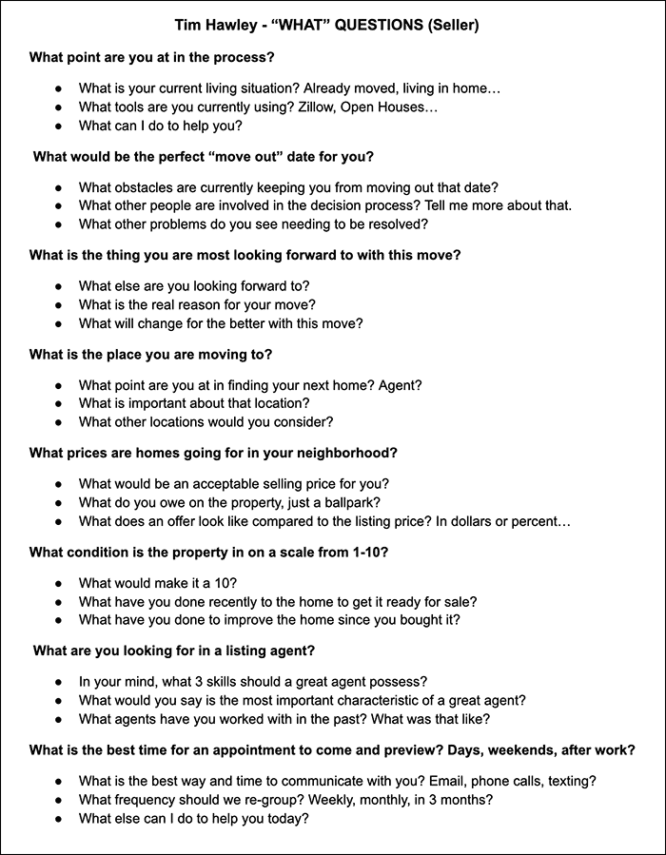No Surprises! How 2 Top Agents Set Client Expectations From Day One
- Published on
- 5 min read
-
 Summer Rylander Contributing AuthorClose
Summer Rylander Contributing AuthorClose Summer Rylander Contributing Author
Summer Rylander Contributing AuthorSummer Rylander is a freelance writer and editor with an abundant background in real estate. A former residential real estate agent in the Columbia, SC area and sales administrator at a commercial real estate firm, she now uses this experience to help guide readers. Summer currently resides in Nuremberg, Germany, where she fulfills her passions of food and travel and avoids her dislikes of mayonnaise and being trapped in an office.
Everything was going according to plan. The house appraised, inspections went smoothly, and the buyer was excited about his soon-to-be new property.
Then, the day before closing, he bought a motorcycle.
You can guess what happened next. The lender reported that the buyer was no longer qualified for his pending mortgage. Just like that, the deal fell apart.
Having warned her client early in the process that now would not be the time to open or close financial accounts, Teresa Cowart was surprised.
“I asked him, ‘Why did you do that? I told you, don’t buy anything!’”
“Well, you didn’t tell me not to buy a motorcycle,” he replied.
For Cowart, a top agent in Savannah, Georgia, and 2019 HomeLight Achievement honoree, the experience was a lesson learned during her first year in real estate in 2005. She’s since developed detailed, design-forward publications that she gives to (and reviews with) each and every client, buyers and sellers alike.
Below, Cowart shows how she uses these publications to set client expectations from the beginning. We’ll also introduce you to another agent who begins every working relationship with an extensive interview that helps avoid surprises during the rest of the transaction.

Teresa Cowart: Putting expectations in print
“I don’t know how you manage every expectation,” Cowart says, “but I think that the more you give [clients] on paper and the more you talk to them and really have conversations with them, the better off you’re going to be in the end.”
Cowart sets expectations by educating her clients about the real estate process. She has separate publications for buyers and sellers, both of which are 20 pages long.
“One of my favorite phrases is ‘conflict arises when expectations differ,’” says Cowart. “When you set the stage right up front — what the normal processes are, what the pitfalls may or may not be — people react much more favorably when things do happen during the process.”
For example, Cowart is especially clear about advising sellers on how, at the beginning, they’ll be hearing from her frequently as she’s getting the house listed and the marketing underway. But once their house is under contract, they probably won’t hear from her quite as much and that doesn’t mean anything bad has happened.
From the client’s perspective, it’s not only knowing what to expect, it’s trusting that you, as their agent, will be there to guide them through this real estate journey with honesty and expertise.
The seller’s booklet also explains and sets expectations about showings, open houses, marketing, photography, and pricing the home.
Since her publications provide a comprehensive overview of the real estate process whether it’s a purchase or a sale, Cowart’s clients have an in-hand resource they can refer to at any time. Then, as the transaction progresses and gentle reminders become inevitable, her publications serve double-duty by reinforcing what has already been discussed.
“It’s not that you can sit down with them in that first meeting and throw all this [information] at them and say, ‘here you go!’” says Cowart. “Sometimes I point things back out to them, like, ‘Remember that seller’s book I gave you?’ and ‘Remember when I said it would take 48 hours for this and 24 hours for that?’ Then it’s ‘Oh, yeah, yeah, you did say that.”
Let’s be honest: It’s great when the aim is to serve your client, but it’s also important to cover your own you-know-what.
Cowart’s buyer booklet gives her clients a detailed look at the step-by-step home-buying process, advice for buyers before they begin looking at homes, and a detailed guide to what happens when they write an offer.
“One of the biggest complaints I hear overall in our industry is, ‘I didn’t know,’ or, ‘She didn’t communicate that to me,’ so my goal since I started [in this business] is to make sure that people are educated,” Cowart says. “It’s hard for somebody to get mad at you and say, ‘You didn’t tell me that,’ when not only did you tell them, but you gave them documentation to back it up.”
Tim Hawley: Insights from an in-depth interview
In Springfield, Missouri, top-selling agent Tim Hawley deploys a different — yet similarly effective — strategy with his clients. He sits down with potential buyers or sellers before any contracts are signed and leads a discussion that he’s designed to be mutually beneficial for both client and agent.
By digging in and finding out expectations early on, Hawley better learns how to keep everyone on the same page. “[My questions] are all ‘What’ questions, and the reason I wrote them that way is because those are open-ended questions. They’re not yes-or-no,” he says.
From his list of questions for potential seller clients, Hawley explains his “three deep” concept, which involves asking one main question, with three similar questions to follow.
“Sometimes people will give you the expected answer, then when they think about it a little more, they’ll give you a more honest answer. When they think about it even more than that, they’ll give you a more personal answer, which is why we go three deep,” he says.
While top real estate agents may be skilled marketers and negotiators, they aren’t necessarily magicians. Part of setting client expectations means being able to help clients understand how the local market will affect what is possible when it comes to selling — or finding — their home.
Hawley broaches this subject as part of his initial interview process, letting his potential clients know that if he picks up on an expectation that feels off during the course of their conversation, he’ll revisit that point. Not only does this allow him a chance to educate, it builds trust. Should they choose to move forward together, the client will know that they can trust Hawley to be genuinely honest with them.
“I’m not going to tell [a seller client] that this is going to be a three-month process or a three-week process, but I need to know if they think I’m going to sell their house in two days because their neighbors did,” says Hawley. “I need to know that.”
Sometimes, managing client expectations takes a bit of scenario repositioning; Especially when it comes to price.
“If I ask [the client] what they think houses are going for and they’re 10-to-15% high, or they say something like, ‘I can’t sell my house unless I get this much’ and it’s 10% over what I’ve already figured out would be a good asking price, I’ll revisit that,” explains Hawley.
“I’ll ask them another question, which would be something like, ‘So, if your house does not sell for this amount of money inside our six-month contract, what are you going to do? If the market only brings you x amount, are you willing to stay in your house, or have your house sit on the market and help other houses sell during that time period?’”
Hawley says that this tactic usually inspires a client to look inward, and think deeper about what may be more feasible for their situation.

Managing the client’s mindset
Ask an agent what happens when you don’t properly set and manage client expectations, and you’ll likely get an answer similar to Hawley’s: “The clients think you’re not working and you don’t deserve your commission.”
When you’ve been in the real estate game for a while, you know how easy it can be for a client’s mind to wander. Whether it’s a few days without a showing, or the weekend has come and gone without newsworthy updates, suddenly your client assumes you’ve dropped the ball.
“It’s really about educating the buyer or seller about what is coming, what is possibly going to happen, the good, the bad, and the ugly,” Cowart says. “It’s all about letting them know ahead of time what the potentials are, then when something crazy happens, you just have to address that. We control the narrative.”
Be careful about unspoken promises
Your reputation might be a surprising source of mismanaged client expectations.
“I don’t want [a client] to come back to me and say, ‘You told us that 75% of your houses sell in three weeks and it’s been three months, what’s going on?’” says Hawley, noting the particular importance of managing expectations when it comes to perceived assurances.
“When you make these kinds of promises, like ‘75% of my houses sell in three weeks,’ you back it up with, ‘and if I am unable to sell your house in three weeks, we will be having a meeting on the 21st day to find out why that happened, why your house is still on the market.’”
To this end, Hawley sends clients an email each Wednesday summarizing the week’s activity, and he follows that up with a phone call each Friday. By providing his clients with a scheduled time for conversation, they know they’ll always have an opportunity to ask questions and express concerns to which Hawley can respond right away.
While it’s easy to assume that a dissatisfied client will speak up, concerns that are left unchecked can fester for days or even weeks. Managing the relationship so that you always know what your client is thinking (or what they may be worrying about) allows you to stay ahead of the curve.
For a client who isn’t immersed in the real estate world day in and day out, the process of buying or selling a house is an information overload times ten. Explaining the procedure and possible setbacks at the beginning of your agreement is a great start, but managing expectations requires ongoing commitment.
“I think a lot of it is just [the clients] knowing that they can ask anything they need to ask and that I’m on their side,” says Cowart. “[My clients] can text me and call me anytime and if I don’t know the answer, I’m going to get it.”
Setting expectations is about eliminating surprises
On a base level, many of us may assume that setting client expectations in real estate is a simple matter of communication. Answering the phone, responding to emails and texts in a timely manner, talking clients through the next steps as the transaction progresses — seems clear, right?
In reality, there’s more to it than that. Whether your client is a first-time buyer or an experienced seller putting her sixth home on the market, they’re going to have certain expectations. Many of those will directly relate to your actions as their agent.
From Cowart and Hawley, we see three clear core components to setting real estate client expectations, whether you use the printed word or in-depth interviews:
- Education
- Honesty
- Communication
Master these elements and you’ll be well on your way to happy, focused clients who feel confident and well-informed.
As Cowart says, “My job is to make sure there are no surprises. Maybe things happen that we can’t control, but there are no surprises along the way. The clients are prepared.”
Header Image Source: (Amy Hirschi / Unsplash)



